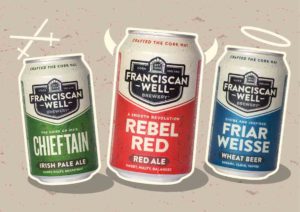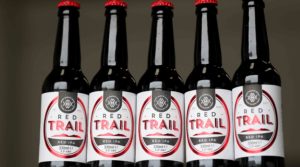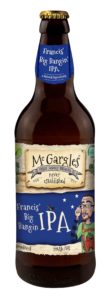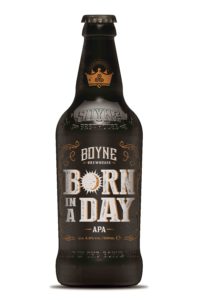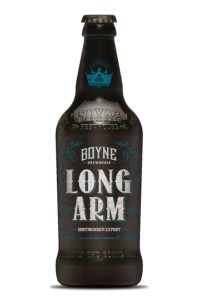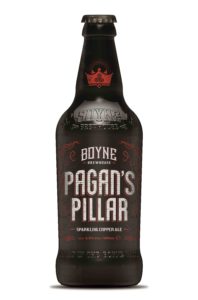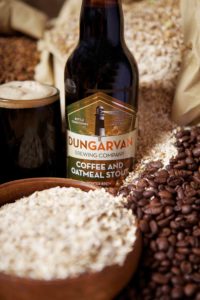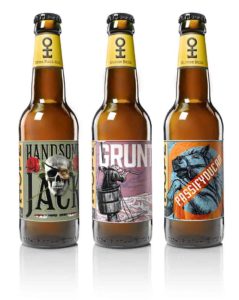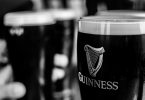Craft Beer – a stimulating market for all
Craft beer today caters for a range of consumers and has even managed to recruit more female consumers, notes the IWSR in its research into this sector.
Interestingly, the IWSR adds that the craft beer movement has stimulated the rest of the beer category “… and positive development has been noted for mainstream brands too, which was particularly noticed in the on-trade.”
Euromonitor is of a similar outlook. In it’s Category Briefing on Beer in Ireland last June it stated, “Craft beer continued to see rapid growth in Ireland during 2015 not only as the brands available expanded, but also because production volumes increased, with over 70% growth recorded in the number of microbreweries operating in the country within just 18 months, rising from 32 in mid-2014 to 55 by the end of 2015.
“Numerous new craft brands emerged, the majority of which are positioned as premium products and demand is being led mainly by urban consumers, especially those living in the Dublin region. However, the strong growth being recorded in sales of craft beer is from a low base, with craft beer estimated to account for only 2% of total beer volume sales in Ireland.”
The Briefing also pointed out that, “The strongly growing craft beer segment has resulted in higher levels of fragmentation in domestic premium lager”, adding, “Beer is currently a dramatically changing category, with smaller craft producers making it much more innovative and dynamic than in previous years. Moreover, by producing more high-quality and high-end products, smaller producers are expected to continue challenging the already established bigger companies, thus forcing them to develop new interesting products in turn.”
Ireland’s craft beer market
The Independent Craft Brewers of Ireland’s annual report, just published, puts the size of the craft beer market in 2015 at 2.5% of total beer consumption (1.7% of production). It projects a figure of 3.4% of total beer consumption for 2016 (3.4% of production) having a value of €59 million.
The Irish craft beer report estimates that there are around 62 production breweries plus 28 ‘contracting’ breweries and indicates quite a significant investment in growing capacity to support future growth so that Bord Bia’s prediction of a 5% market share for craft beer by 2020 seems realistic.
Craft value
The value of the craft beer market has risen by 180% since 2011 according to estimates in Euromonitor’s Category Briefing.
The share of craft beer sales is higher in the Dublin region but still remains low.
Craft beer was one of the few alcoholic drinks categories to benefit from the economic downturn resulting in consumers re-thinking their drinking habits.
Increasingly, consumers are looking for quality and value for money, states Euromonitor, while also seeking to support local producers and suppliers across a vast range of consumer products.
Craft Beers defining the market
Despite all the publicity around craft beer, a generally agreed upon definition of craft beer remains as far off as ever, it seems. Market researcher Mintel discovered that many UK consumers are still unsure what the term ‘craft’ actually means.
In its recently-published Attitudes towards Craft Alcoholic Drinks UK 2016 report Mintel found that a third (33%) of British consumers buying alcoholic drinks find it hard to tell which brands are ‘craft’ and 30% say they don’t understand what’s meant by the term ‘craft’. Despite this over a third (38%) had purchased a craft alcoholic drink in the three months to November 2015.
In a survey on the subject last year, the researcher found, for example, that 47% of respondents associated ‘unique flavour’ with craft drinks while 42% associated them with the use of ‘high quality ingredients’. 41% believed that ‘more care/time’ was taken in their production while 41% also associated ‘produced in small volumes’ with their idea of a craft drink.
Mintel’s Senior Drinks Analyst Chris Wisson believes that the lack of an industry-agreed definition has led to the term being misinterpreted and increasingly misused. “Consumers are likely to become increasingly demanding of brands which claim to be ‘craft’ and the onus is on these brands to ensure that they can provide clear evidence of their craft credentials,” he says, “The uncertainty around the term dilutes its ability to differentiate brands or justify a higher price. This suggests the need to reference other, more tangible points of difference to capture customers’ attention.”
This has significant implications for craft beer producers who cannot utilise the economies of large-scale production.
“Many craft beers are justifiably more expensive than mainstream brands, reflecting economies of scale but also the ingredients used,” adds Chris Wisson, “While consumer interest in seeing a wider variety of beers in the on-trade should benefit craft variants, overpricing poses a potential barrier to the continued growth of the segment.”
Craft pricing
Mintel’s research found that whilst there’s strong interest in craft alcoholic drinks, excessively high pricing may hinder the growth of the sector in the future. Two in five (41%) buying alcoholic drinks in the UK say that you often get less for your money with craft alcoholic drinks (for example smaller bottles for the same price) while only 28% say that craft drinks are worth paying more for.
The problem becomes even more acute with private label for the multiples.
Private label craft beers
The Euromonitor Category Briefing on Beer in Ireland from last September pointed out, “While the vast majority of these products can be classed as premium, a growing range of private label products are also emerging, offering lower price points and thus serving to attract a growing number of consumers”.
Productively speaking, this country does have a fiscal definition of ‘craft beer’ however.
The government has decreed that breweries producing under 30,000 Hectolitres of beer a year qualify for a 50% excise duty rebate.
And the Independent Craft Brewers of Ireland has just launched the ‘Independent Irish Craft Beer’ symbol to help consumers identify beer from local Irish craft breweries.
What’s in a glass?
The Mintel report shows that the most likely craft buyers are men.
For the majority of drinkers it seems to be more about what’s in the glass rather than who makes it. Over two-thirds (70%) of those buying alcoholic drinks say that taste is more important than the producer of the drink.
“The importance attached to taste is likely to be driving the interest in craft-style products from larger drink producers,” concludes Chris, “This suggests that the large drinks companies can tap into the craft movement either by producing their own craft products or by acquiring smaller companies, with their success ultimately likely to be determined by the actual quality of the drinks.”
As economic recovery continues, the momentum gained by craft beer is increasing, being further driven by the uptake of these products in bars and off-licences.
It’s now common for off-trade outlets to stock a small (and increasingly not-so-small) but diverse range of such products, with local craft beers often featured.
In the on-trade, a growing number of outlets meanwhile feature a different craft beer each month or dedicate a tap to a changing range of craft beer.
Even Diageo has begun introducing its experimental beers to Dublin pubs with a guest tap set to change every two months.
The way craft beer is consumed is also changing, with an increasing trend towards matching beer to food or to specific occasions, much as is seen with wine.
Franciscan Well, Ireland’s Favourite craft beer canned!
Franciscan Well, Ireland’s No 1 craft beer brand, has brought its award-winning craft beer into can format. Rebel Red, Friar Weisse and Chieftain IPA are being offered in a 330ml can for the first time to the off-trade across Ireland, with selected on-trade sites also stocking the product.
It’s the first time Franciscan Well has canned any of its beers.
Consumers will not only be able to buy Friar Weisse or Chieftain IPA in the off-trade for the first time but will be able to access it in an increasingly popular and fast-growing format.
The decision to can these beers was part of an international trend which has seen rising consumer demand for craft beer in can instead of bottle. 25% of all craft beer sold in the US off-trade is in canned format. In Ireland craft beer sold in cans accounts for around 15% of off-sales. That figure is expected to double over the next couple of years.
New Brand Identity
The Franciscan Well range has also been rebranded and features a new logo encapsulating the brand’s home-grown heritage, better reflecting its provenance and Irish roots. This is rolling out across both channels over coming weeks.
The new brand mark positions Franciscan Well as an authentic craft brewery from Cork, Ireland. The archway is a new device that’s been created to highlight a strong sense of place, that’s welcoming and which captures the unrivalled heritage associated with the brewery founding site along with the welcoming aspect of its range of beers.
Mourne Mountains Brewery’s Red IPA wins two Great Taste stars
Warrenpoint-based Mourne Mountains Brewery has become the only craft beer brewery in Northern Ireland to be awarded a 2-star Great Taste Award for its Red IPA, Red Trail, at the 2016 Great Taste Awards at the world’s blind-taste awards celebrating the very best in food and drink.
Of 10,000 Great Taste entries this year, only 878 products received a 2-star accolade.
“It was one of the first beers developed by our talented Master Brewer Tom Ray when we established the brewery,” said Brewery Founder Connaire McGreevy, “He combines speciality caramel and crystal malts with roasted barley in the grist and carefully creates a generous hop flavouring and aroma along with a long, dry finish.
“Our East Coast IPA has also been celebrated, winning a Silver Medal at the Dublin Craft Beer Cup earlier this year. Again it was the only brewery from NI to be recognised.
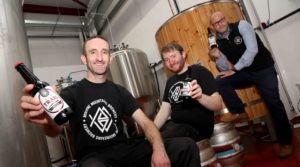 “It’s early days for us as and we’ve some very exciting plans in the pipeline for new concepts and flavours. One of the best things about running a craft brewery is the freedom to be as creative and innovative as we like,” he added.
“It’s early days for us as and we’ve some very exciting plans in the pipeline for new concepts and flavours. One of the best things about running a craft brewery is the freedom to be as creative and innovative as we like,” he added.
Rye River Brewing Company
It’s been a big year for the Kildare-based Rye River Brewing Company. In January the Brewery moved location from Kilcock to a new premises in Celbridge, Co Kildare, in order to further develop the brewery’s production and innovation plans. The investment has paid off, with its McGargles brand continuing to grow from strength to strength and it’s got the awards to prove it!
Having started on the right foot with a huge win at AllTech Craft Beer Festival in Dublin (The Dublin Craft Beer Cup for McGargles Francis Big Bangin’ IPA), the awards have been non-stop this year.
So far in 2016, McGargles beers have collected 16 awards, including: four medals to complement its craft beer cup win at the AllTech Craft Beer & Cider awards, four Great Taste awards, two World Beer Awards and another three awards at the International Beer Challenge as well as a Gold and Silver at the Meininger International Craft Beer Awards.
Rye River Brewery also recently announced that it has secured the distribution contract for SweetWater, one of the top 20 US craft beer brands. Not only is this the first time that SweetWater will be pouring in Ireland, it’s the first time it will pour anywhere outside the US.
As yet, not many US craft breweries (especially of SweetWater’s size) have dipped into the international market, but with a huge demand for American-style craft beers here in Ireland, Rye River thinks this will be big!
Boyne Brewhouse’s debut range of bottled craft beers: Long Arm, Born in a Day and Pagan’s Pillar
The family-owned Boyne Brewhouse craft brewery located in the heart of Drogheda, Co Meath, has unveiled its debut range of bottled craft beers, produced using traditional craft brewing methods and local ingredients.
The range consists of Born in a Day Australian Pale Ale, Long Arm Dortmunder Export and Pagan’s Pillar Sparking Copper Ale, all at ABV 4.8%, available in both 500ml bottle and on draught, with 330ml cans soon to follow along with a range of speciality beers and seasonals. .
The Boyne Brewhouse craft brewery is part of the Boann Distillery and Visitor Centre, a project which will produce craft whiskey, gin and this range of craft beers for the domestic and export markets.
Head Brewer and Galway native Áine O’Hora graduated from Heriot Watt and honed her craft for the past seven years as Brewer with Matilda Bay, Australia’s most awarded craft brewery.
The Boann Distillery and Boyne Brewhouse are the realisation of a long-held ambition of the Cooney family who’ve a long tradition in the Irish drinks industry. Pat Cooney built the Gleeson Group to be a major player in the Irish manufacturing and wholesale drinks business over the last 40 years. Part of this business was sold in 2012 to C&C whilst a cream liqueur facility (RA Merrys and Co) and cidery (Adams Cider Company) were retained by the Cooney family. Pat, his wife Marie and four of their children are all actively involved in running the business.
Dungarvan Brewing
One of the longer-established Irish micro-breweries Dungarvan Brewing Company celebrated its sixth birthday earlier this year and has continued to go from strength to strength. Specialising in traditional-style bottle-conditioned ales and stouts, all the beers are brewed and bottled on site in Dungarvan with Head Brewer Cormac O’Dwyer overseeing every stage of the brew and ensuring each beer achieves the highest standards he has set.
Dungarvan beers are renowned for consistently high quality and are chosen as an ingredient by many acclaimed Irish producers including Keogh’s Farm who use Black Rock Irish Stout in its beef and stout-flavoured crisps and Ballymaloe Sauces who uses the beers in its recently-launched steak sauce. Many of Ireland’s top chefs, including another Dungarvaner Paul Flynn, are champions of the beers and use them in their restaurants and their cooking.
Alongside the core range, Dungarvan’s seasonals and one-off brews continue to be highly anticipated releases, with Autumn seasonal Gallows Hill, an 8.5% ABV barley wine, set for an October release this year and annual favourite Coffee and Oatmeal Stout – made with Flahavan’s oats and Badger and Dodo coffee – hitting shelves from November in time for the Christmas market.
www.dungarvanbrewingcompany.com
From beermat to Hope
In November 2014 Hope Beer started life on the back of a beermat, progressed to a business plan and became a fully-fledged brewery in May 2016.
Hope is the brainchild of old friends Wim de Jongh, Des McSwiggan and Jeanne Mahony – three proud Dubs from the Northside of the city with a passion for beer and business.
Although there are many micro-breweries in Ireland there’s only a handful in Dublin, most with limited capacity. Hope is the first significant brewery to open in Dublin for many years and the only micro-brewery in the Fingal region. Hope Brewery represents a substantial capital investment and has significant capacity.
It started with a trio of beers as a core range – Grunt, its bone-dry, citrusy, Saison ale; Passifyoucan, its malty, fruity Blonde ale and Handsome Jack – an easy-drinking IPA.
The labelling reveals Hope Beer to be a premium product to be enjoyed with food and each beer has suggested food pairings.
The quirky names of each of its beers are based on stories depicting an historical figure or local place name and are linked to very strong branding.
Hope has also launched a new limited-edition series of beers: Hope Edition No 1 is a fresh easy-drinking Session IPA while Hope Edition No 2 is a crisp, flavoursome unfiltered lager. Hope is already planning to brew the next couple of beers in the series.



